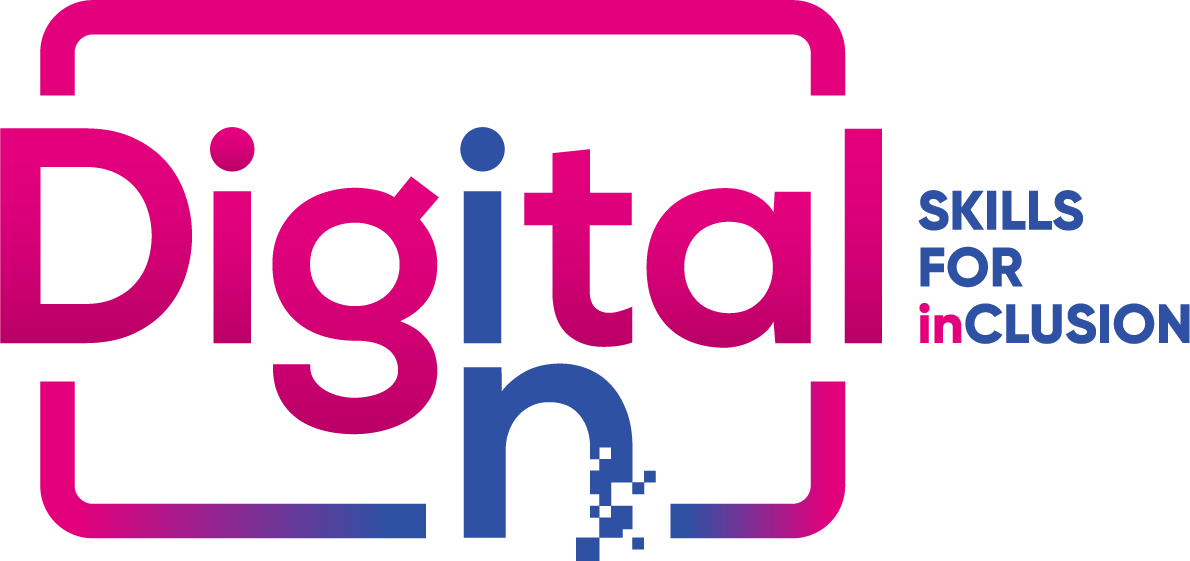The digital divide continues to be a pressing issue across Europe, particularly for those considered digitally vulnerable—seniors and micro-entrepreneurs among them. In an increasingly digitalized society, access to digital tools and the skills to use them are essential for full participation in daily life, from accessing services and communicating with family to operating a business. The “DIGITAL-IN: Digital skills for the inclusion of digitally vulnerable groups” project, funded under the Erasmus+ Programme, addresses this critical issue head-on. It aims to equip adult learners from vulnerable groups with the competencies needed to thrive in the digital world, and to empower educators to support them through tailored, inclusive strategies.
What is the DIGITAL SKILLS TRAINING GUIDE for Educators?
The DIGITAL-IN Training Guide—formally titled ‘DIGITAL SKILLS TRAINING GUIDE FOR EDUCATORS: RECOMMENDATIONS FOR INCLUDING VULNERABLE GROUPS’—is a practical and comprehensive manual intended for educators, trainers, policy-makers, and other stakeholders in adult education. Its main goal is to offer structured guidance on designing and adapting training to meet the specific needs of digitally vulnerable groups (DVGs), including seniors and small business owners. Developed collaboratively by organizations from Greece, Cyprus, Italy, Lithuania, and Spain, this guide is based on qualitative research, field interviews, stakeholder feedback, and best practices in adult digital education.
How to Use the Guide
The guide is organized into four core sections, each one offering practical frameworks and strategies for educators:
1. Definition of Learner Profiles: Understanding the psychological, social, and economic backgrounds of DVGs is essential to designing effective training. The guide outlines the core characteristics, motivations, and barriers experienced by both seniors and micro-entrepreneurs.
2. Pedagogical Strategies: This section introduces learning methodologies that respond to the unique challenges of DVGs. Strategies include adaptive learning, experiential methods, peer-to-peer and intergenerational learning, repetition-based techniques, game-based methods, and mentoring. Each approach is contextualized with examples and tips for implementation.
3. Recommended Content Areas: The guide provides detailed digital curriculum suggestions, aligned with the DigComp 2.2 framework. Topics include safety and privacy, communication tools, digital marketing for small businesses, and AI literacy, tailored to the learners’ interests and digital maturity.
4. Communication Strategies: Effective communication with DVGs is key to inclusion. This section includes strategies for plain language, the use of visual aids, non-hostile framing, and digital writing techniques.
Highlights and Examples of Use
- A trainer working with elderly learners in a rural Greek community might use the guide’s kinesthetic and peer-learning strategies to encourage hands-on smartphone training.
- An adult educator in Spain could incorporate the microlearning modules recommended in the guide for small business owners wanting to launch an online shop.
- A municipality designing a digital skills campaign could use the guide’s section on inclusive communication to craft messages that resonate with older adults and low-income populations.
A Practical Step Toward a More Inclusive Digital Society
The DIGITAL-IN Training Guide does more than offer theory—it serves as a blueprint for inclusive action. With demographic shifts, digital policy developments, and economic transitions in motion, the importance of equipping vulnerable populations with digital skills cannot be overstated. This guide enables educators and local training providers to meet learners where they are—respecting their needs, valuing their experiences, and building a truly inclusive digital future.
Explore the Online, Interactive Version
To complement the full guide, the DIGITAL-IN consortium has also developed a user-friendly online version. This digital manual presents a concise and engaging overview of the entire Training Guide in an accessible storytelling format. Trainers who prefer a quick-reference or interactive learning tool will find it especially useful.
Visit the online version.
Download the complete DIGITAL-IN Training Guide.
About the DIGITAL IN Project
The DIGITAL-IN “Digital skills for the inclusion of digitally vulnerable groups” project, co-funded by the European Union under the Erasmus+ programme, is dedicated to bridging the digital divide that affects key vulnerable groups—namely, seniors and small business owners. Implemented across five EU countries—Cyprus, Greece, Lithuania, Spain, and Italy—the project aims to promote digital inclusion by identifying skill gaps, addressing structural barriers, and supporting the development of learner-centered solutions in adult digital education.
Participating institutions
- E-learning programme of the National and Kapodistrian University of Athens, Greece
- EMIT Feltrinelli ETS, Italy
- InterCollege, Cyprus
- Magtel Foundation, Spain
- T.O.R.O. Training, Lithuania
Source: European Digital Skills & Jobs Platform


